A Report on Medication Adherence Among Children Diagnosed with ADHD
VerifiedAdded on 2023/04/21
|18
|4308
|217
Report
AI Summary
This report critically evaluates factors influencing medication adherence in children with ADHD, utilizing a systematic review and a quantitative research article. The analysis identifies key factors affecting adherence and discontinuation, such as age, gender, treatment duration, dosage, co-morbidities, and parental expectations. The report also highlights the importance of motivational strategies for improving adherence in single-parent families. While acknowledging the limitations of the reviewed studies, the report suggests that APNs can use these findings to counsel parents and improve adherence by fostering positive mentalities and providing clear explanations of ADHD medications. Further research is recommended to address gaps in gender comparisons and real-world observations, ensuring evidence-based practices in APN care. Access more solved assignments on Desklib.
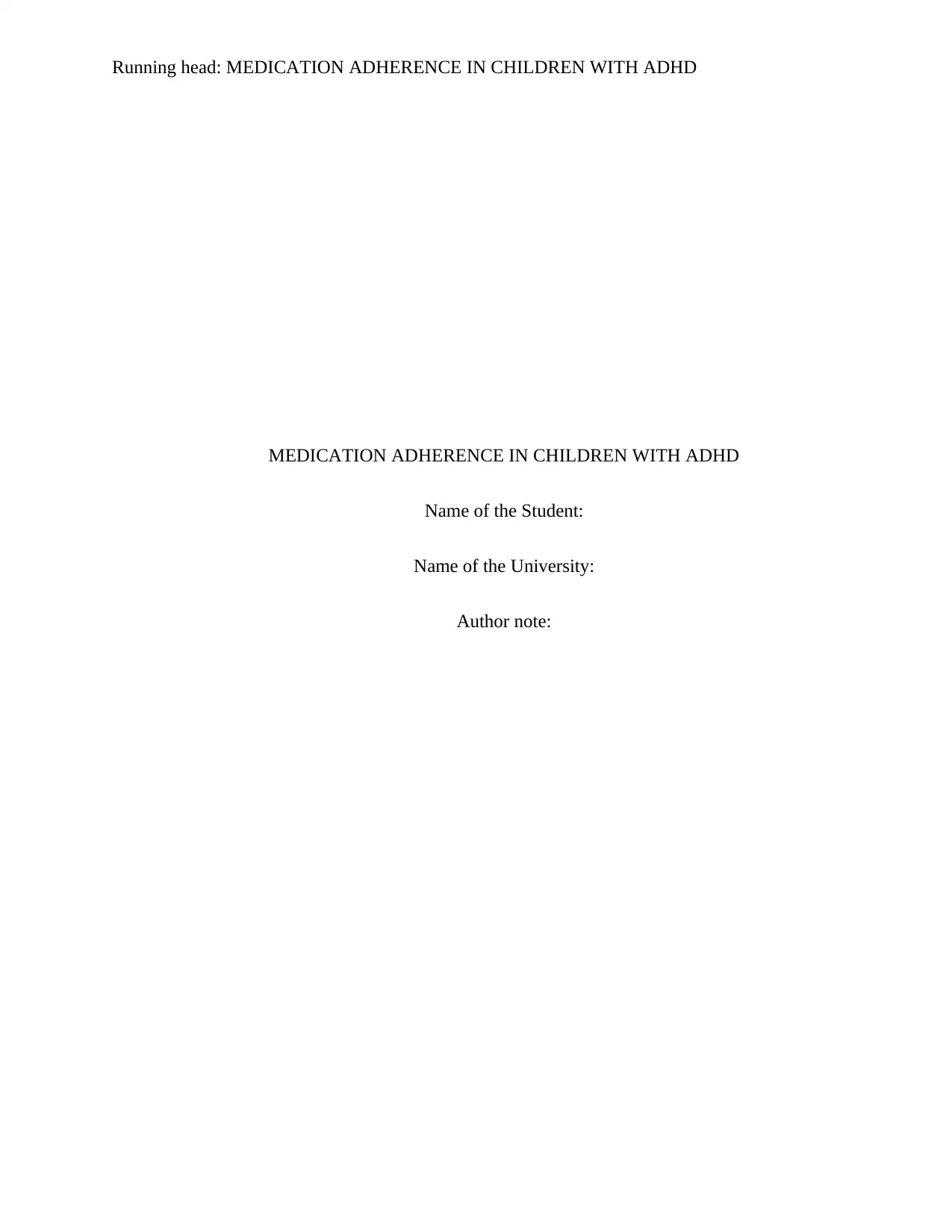
Running head: MEDICATION ADHERENCE IN CHILDREN WITH ADHD
MEDICATION ADHERENCE IN CHILDREN WITH ADHD
Name of the Student:
Name of the University:
Author note:
MEDICATION ADHERENCE IN CHILDREN WITH ADHD
Name of the Student:
Name of the University:
Author note:
Paraphrase This Document
Need a fresh take? Get an instant paraphrase of this document with our AI Paraphraser
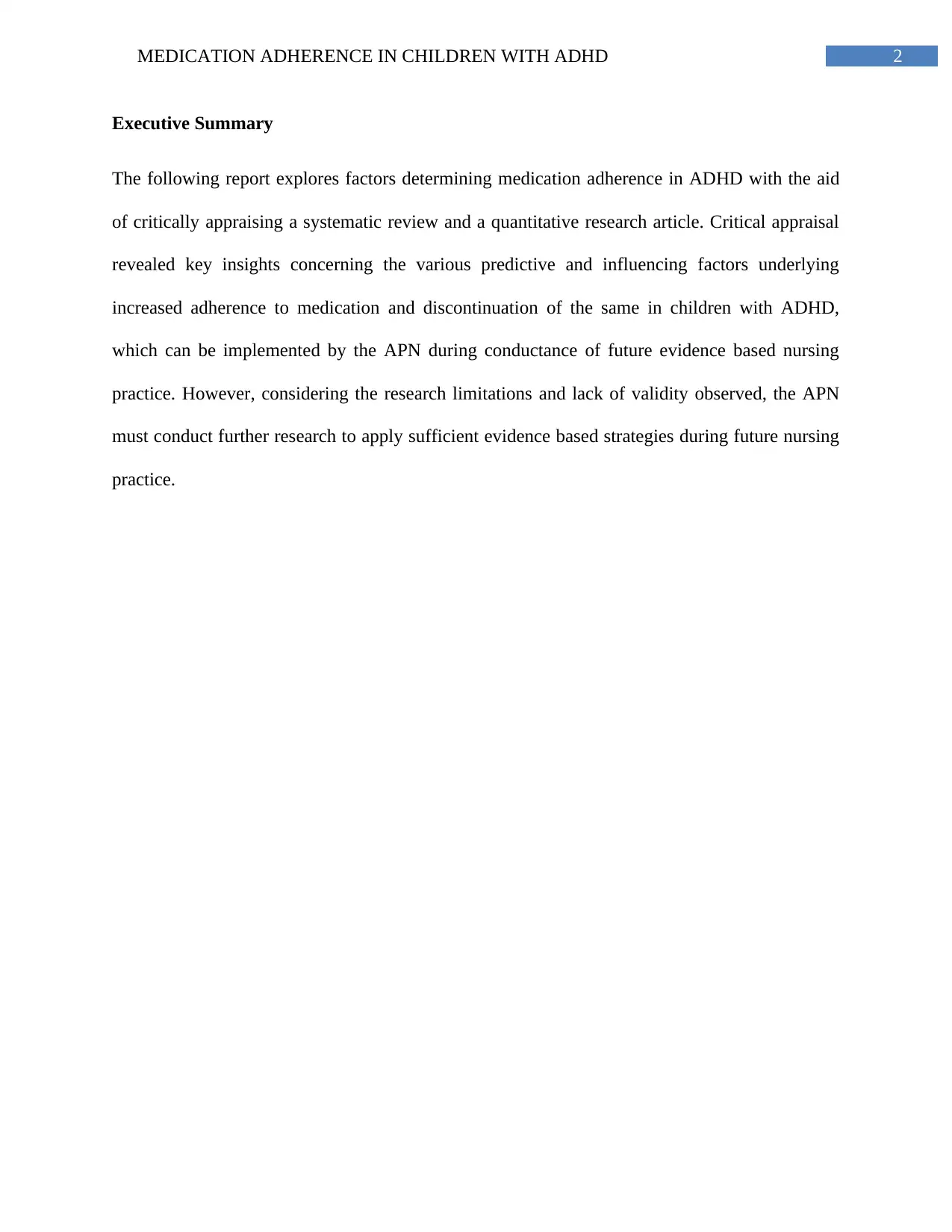
2MEDICATION ADHERENCE IN CHILDREN WITH ADHD
Executive Summary
The following report explores factors determining medication adherence in ADHD with the aid
of critically appraising a systematic review and a quantitative research article. Critical appraisal
revealed key insights concerning the various predictive and influencing factors underlying
increased adherence to medication and discontinuation of the same in children with ADHD,
which can be implemented by the APN during conductance of future evidence based nursing
practice. However, considering the research limitations and lack of validity observed, the APN
must conduct further research to apply sufficient evidence based strategies during future nursing
practice.
Executive Summary
The following report explores factors determining medication adherence in ADHD with the aid
of critically appraising a systematic review and a quantitative research article. Critical appraisal
revealed key insights concerning the various predictive and influencing factors underlying
increased adherence to medication and discontinuation of the same in children with ADHD,
which can be implemented by the APN during conductance of future evidence based nursing
practice. However, considering the research limitations and lack of validity observed, the APN
must conduct further research to apply sufficient evidence based strategies during future nursing
practice.
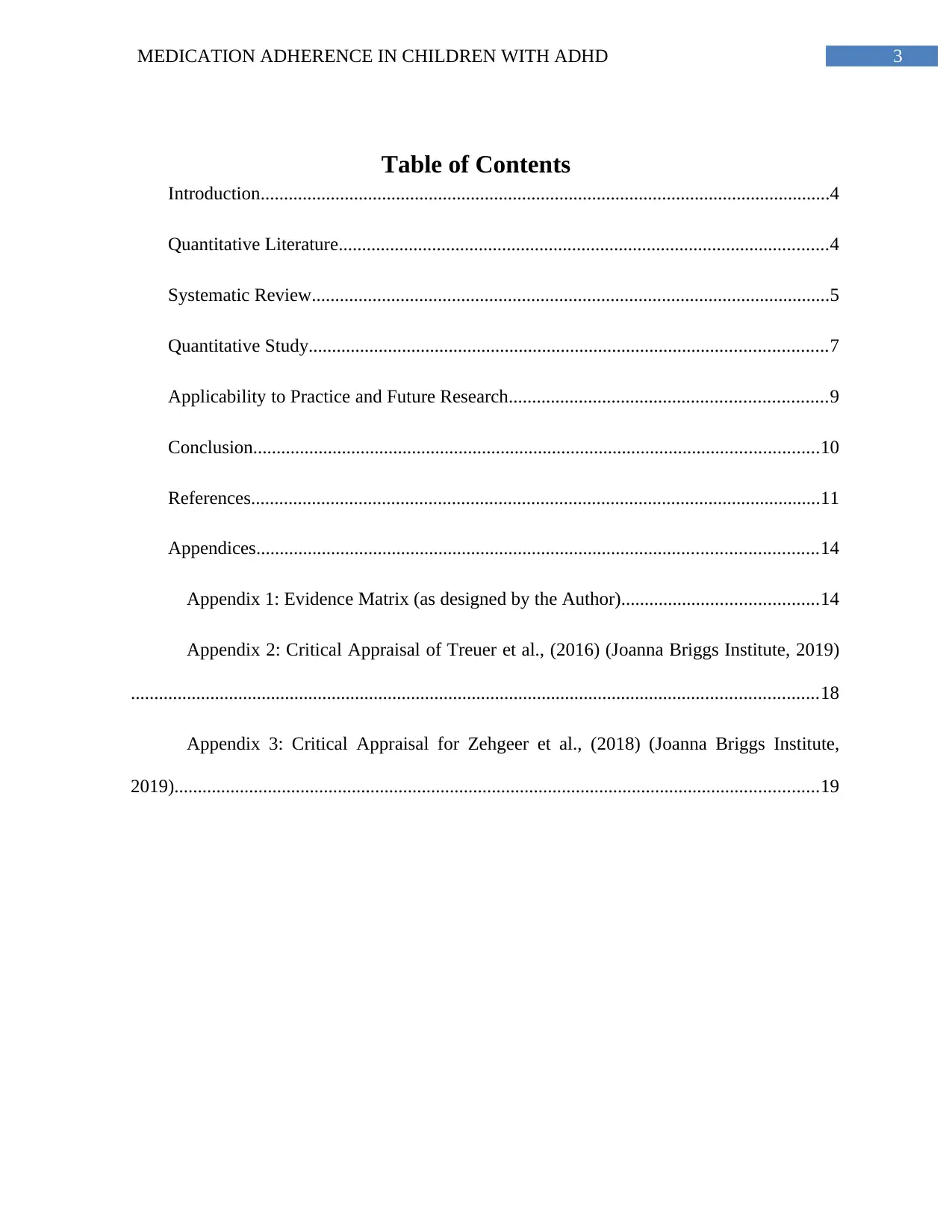
3MEDICATION ADHERENCE IN CHILDREN WITH ADHD
Table of Contents
Introduction..........................................................................................................................4
Quantitative Literature.........................................................................................................4
Systematic Review...............................................................................................................5
Quantitative Study...............................................................................................................7
Applicability to Practice and Future Research....................................................................9
Conclusion.........................................................................................................................10
References..........................................................................................................................11
Appendices........................................................................................................................14
Appendix 1: Evidence Matrix (as designed by the Author)..........................................14
Appendix 2: Critical Appraisal of Treuer et al., (2016) (Joanna Briggs Institute, 2019)
...................................................................................................................................................18
Appendix 3: Critical Appraisal for Zehgeer et al., (2018) (Joanna Briggs Institute,
2019)..........................................................................................................................................19
Table of Contents
Introduction..........................................................................................................................4
Quantitative Literature.........................................................................................................4
Systematic Review...............................................................................................................5
Quantitative Study...............................................................................................................7
Applicability to Practice and Future Research....................................................................9
Conclusion.........................................................................................................................10
References..........................................................................................................................11
Appendices........................................................................................................................14
Appendix 1: Evidence Matrix (as designed by the Author)..........................................14
Appendix 2: Critical Appraisal of Treuer et al., (2016) (Joanna Briggs Institute, 2019)
...................................................................................................................................................18
Appendix 3: Critical Appraisal for Zehgeer et al., (2018) (Joanna Briggs Institute,
2019)..........................................................................................................................................19
⊘ This is a preview!⊘
Do you want full access?
Subscribe today to unlock all pages.

Trusted by 1+ million students worldwide
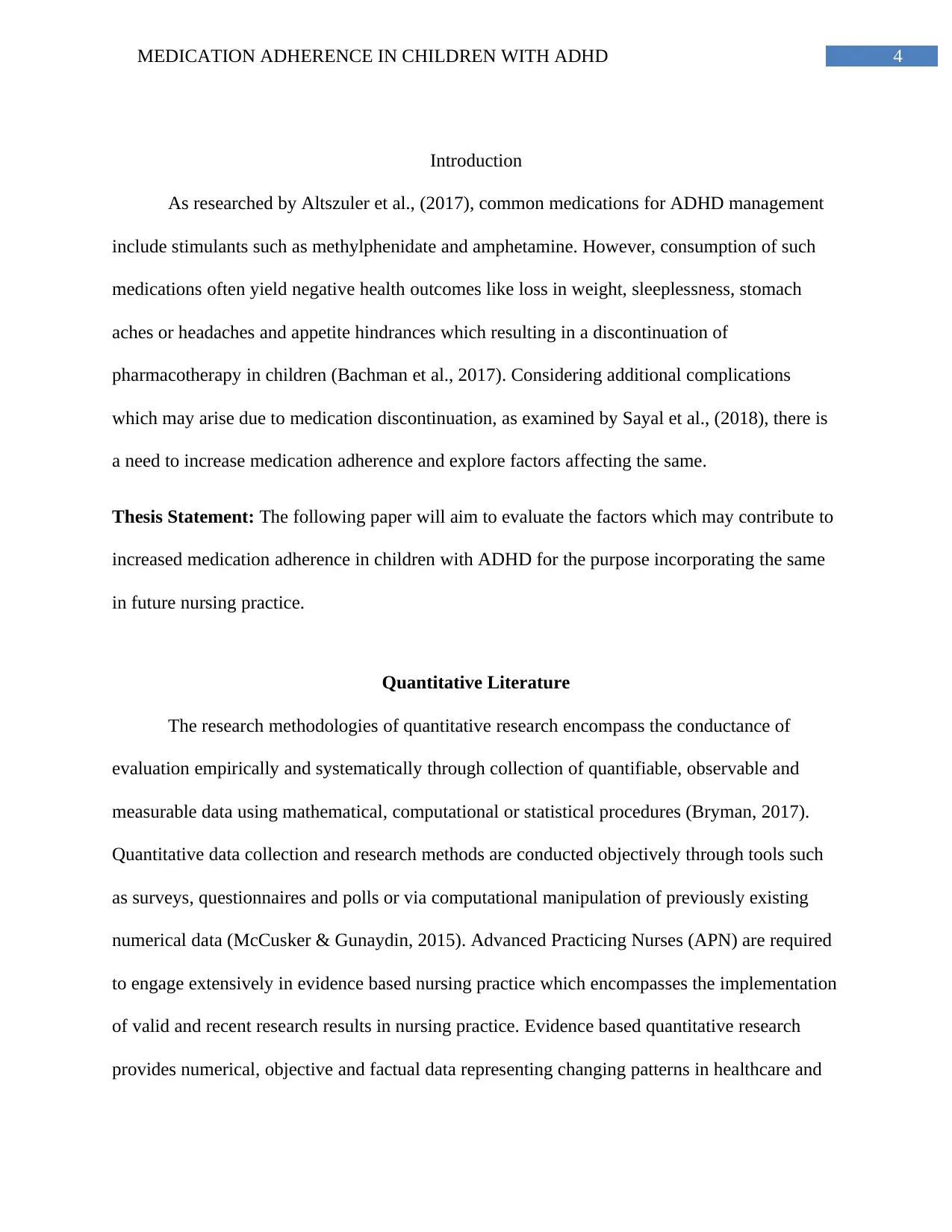
4MEDICATION ADHERENCE IN CHILDREN WITH ADHD
Introduction
As researched by Altszuler et al., (2017), common medications for ADHD management
include stimulants such as methylphenidate and amphetamine. However, consumption of such
medications often yield negative health outcomes like loss in weight, sleeplessness, stomach
aches or headaches and appetite hindrances which resulting in a discontinuation of
pharmacotherapy in children (Bachman et al., 2017). Considering additional complications
which may arise due to medication discontinuation, as examined by Sayal et al., (2018), there is
a need to increase medication adherence and explore factors affecting the same.
Thesis Statement: The following paper will aim to evaluate the factors which may contribute to
increased medication adherence in children with ADHD for the purpose incorporating the same
in future nursing practice.
Quantitative Literature
The research methodologies of quantitative research encompass the conductance of
evaluation empirically and systematically through collection of quantifiable, observable and
measurable data using mathematical, computational or statistical procedures (Bryman, 2017).
Quantitative data collection and research methods are conducted objectively through tools such
as surveys, questionnaires and polls or via computational manipulation of previously existing
numerical data (McCusker & Gunaydin, 2015). Advanced Practicing Nurses (APN) are required
to engage extensively in evidence based nursing practice which encompasses the implementation
of valid and recent research results in nursing practice. Evidence based quantitative research
provides numerical, objective and factual data representing changing patterns in healthcare and
Introduction
As researched by Altszuler et al., (2017), common medications for ADHD management
include stimulants such as methylphenidate and amphetamine. However, consumption of such
medications often yield negative health outcomes like loss in weight, sleeplessness, stomach
aches or headaches and appetite hindrances which resulting in a discontinuation of
pharmacotherapy in children (Bachman et al., 2017). Considering additional complications
which may arise due to medication discontinuation, as examined by Sayal et al., (2018), there is
a need to increase medication adherence and explore factors affecting the same.
Thesis Statement: The following paper will aim to evaluate the factors which may contribute to
increased medication adherence in children with ADHD for the purpose incorporating the same
in future nursing practice.
Quantitative Literature
The research methodologies of quantitative research encompass the conductance of
evaluation empirically and systematically through collection of quantifiable, observable and
measurable data using mathematical, computational or statistical procedures (Bryman, 2017).
Quantitative data collection and research methods are conducted objectively through tools such
as surveys, questionnaires and polls or via computational manipulation of previously existing
numerical data (McCusker & Gunaydin, 2015). Advanced Practicing Nurses (APN) are required
to engage extensively in evidence based nursing practice which encompasses the implementation
of valid and recent research results in nursing practice. Evidence based quantitative research
provides numerical, objective and factual data representing changing patterns in healthcare and
Paraphrase This Document
Need a fresh take? Get an instant paraphrase of this document with our AI Paraphraser
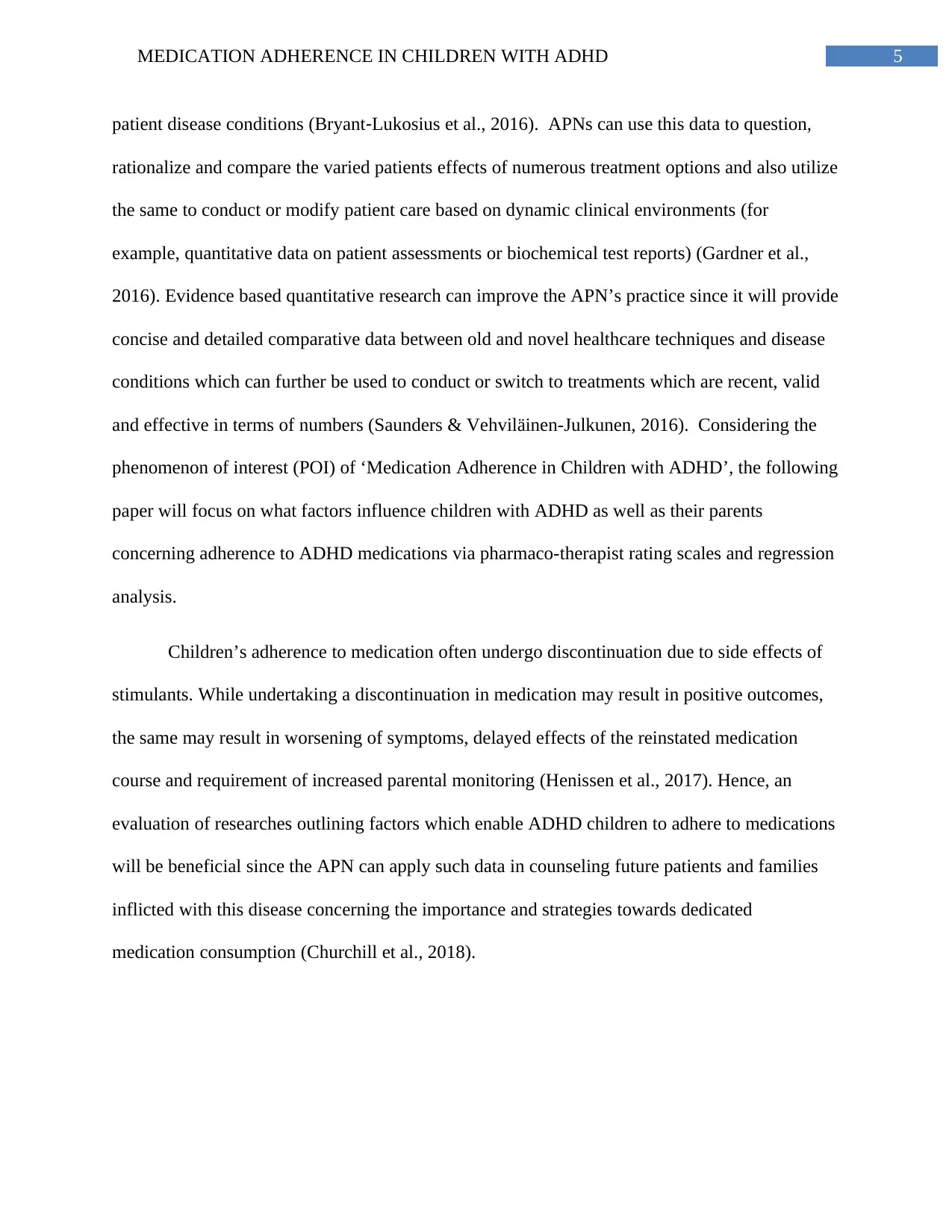
5MEDICATION ADHERENCE IN CHILDREN WITH ADHD
patient disease conditions (Bryant‐Lukosius et al., 2016). APNs can use this data to question,
rationalize and compare the varied patients effects of numerous treatment options and also utilize
the same to conduct or modify patient care based on dynamic clinical environments (for
example, quantitative data on patient assessments or biochemical test reports) (Gardner et al.,
2016). Evidence based quantitative research can improve the APN’s practice since it will provide
concise and detailed comparative data between old and novel healthcare techniques and disease
conditions which can further be used to conduct or switch to treatments which are recent, valid
and effective in terms of numbers (Saunders & Vehviläinen-Julkunen, 2016). Considering the
phenomenon of interest (POI) of ‘Medication Adherence in Children with ADHD’, the following
paper will focus on what factors influence children with ADHD as well as their parents
concerning adherence to ADHD medications via pharmaco-therapist rating scales and regression
analysis.
Children’s adherence to medication often undergo discontinuation due to side effects of
stimulants. While undertaking a discontinuation in medication may result in positive outcomes,
the same may result in worsening of symptoms, delayed effects of the reinstated medication
course and requirement of increased parental monitoring (Henissen et al., 2017). Hence, an
evaluation of researches outlining factors which enable ADHD children to adhere to medications
will be beneficial since the APN can apply such data in counseling future patients and families
inflicted with this disease concerning the importance and strategies towards dedicated
medication consumption (Churchill et al., 2018).
patient disease conditions (Bryant‐Lukosius et al., 2016). APNs can use this data to question,
rationalize and compare the varied patients effects of numerous treatment options and also utilize
the same to conduct or modify patient care based on dynamic clinical environments (for
example, quantitative data on patient assessments or biochemical test reports) (Gardner et al.,
2016). Evidence based quantitative research can improve the APN’s practice since it will provide
concise and detailed comparative data between old and novel healthcare techniques and disease
conditions which can further be used to conduct or switch to treatments which are recent, valid
and effective in terms of numbers (Saunders & Vehviläinen-Julkunen, 2016). Considering the
phenomenon of interest (POI) of ‘Medication Adherence in Children with ADHD’, the following
paper will focus on what factors influence children with ADHD as well as their parents
concerning adherence to ADHD medications via pharmaco-therapist rating scales and regression
analysis.
Children’s adherence to medication often undergo discontinuation due to side effects of
stimulants. While undertaking a discontinuation in medication may result in positive outcomes,
the same may result in worsening of symptoms, delayed effects of the reinstated medication
course and requirement of increased parental monitoring (Henissen et al., 2017). Hence, an
evaluation of researches outlining factors which enable ADHD children to adhere to medications
will be beneficial since the APN can apply such data in counseling future patients and families
inflicted with this disease concerning the importance and strategies towards dedicated
medication consumption (Churchill et al., 2018).
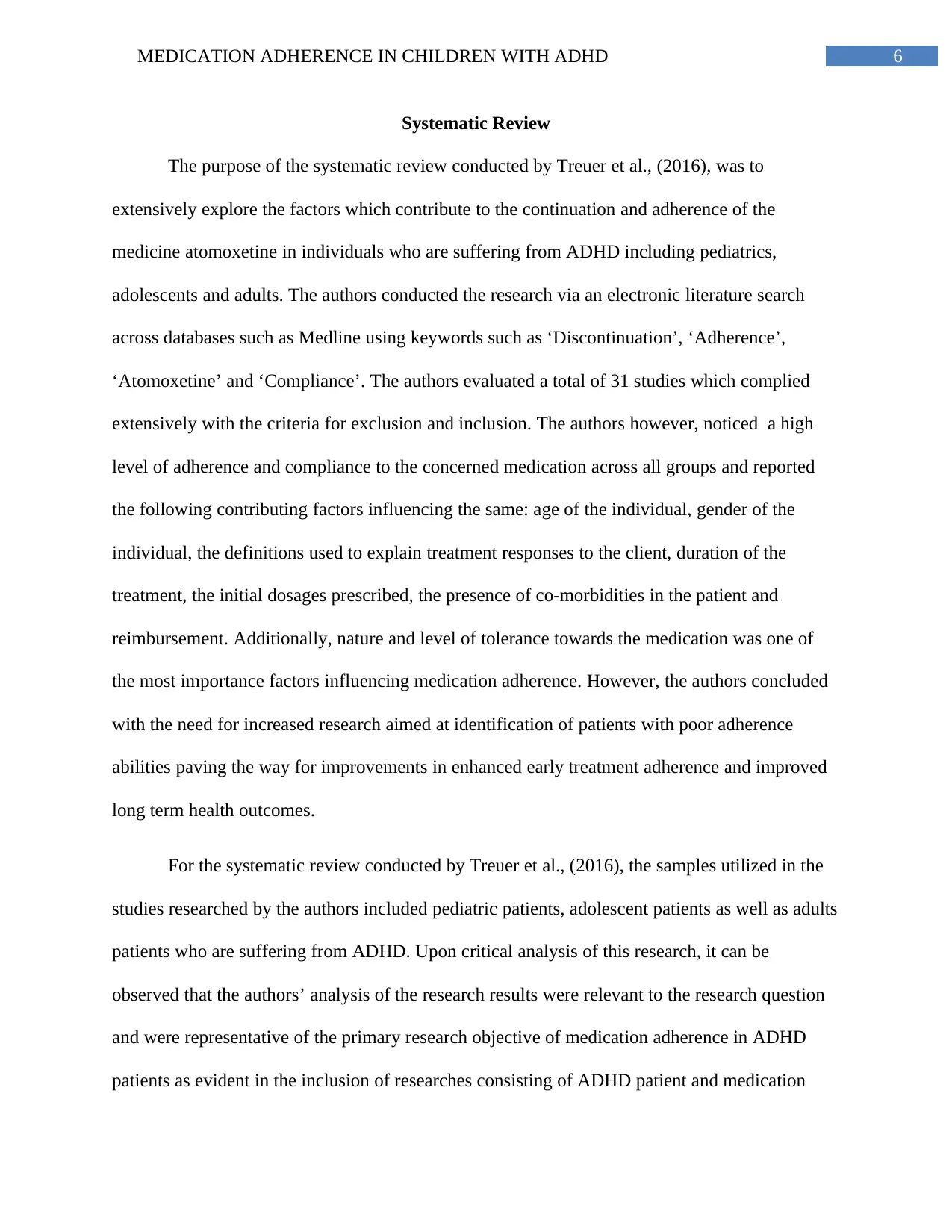
6MEDICATION ADHERENCE IN CHILDREN WITH ADHD
Systematic Review
The purpose of the systematic review conducted by Treuer et al., (2016), was to
extensively explore the factors which contribute to the continuation and adherence of the
medicine atomoxetine in individuals who are suffering from ADHD including pediatrics,
adolescents and adults. The authors conducted the research via an electronic literature search
across databases such as Medline using keywords such as ‘Discontinuation’, ‘Adherence’,
‘Atomoxetine’ and ‘Compliance’. The authors evaluated a total of 31 studies which complied
extensively with the criteria for exclusion and inclusion. The authors however, noticed a high
level of adherence and compliance to the concerned medication across all groups and reported
the following contributing factors influencing the same: age of the individual, gender of the
individual, the definitions used to explain treatment responses to the client, duration of the
treatment, the initial dosages prescribed, the presence of co-morbidities in the patient and
reimbursement. Additionally, nature and level of tolerance towards the medication was one of
the most importance factors influencing medication adherence. However, the authors concluded
with the need for increased research aimed at identification of patients with poor adherence
abilities paving the way for improvements in enhanced early treatment adherence and improved
long term health outcomes.
For the systematic review conducted by Treuer et al., (2016), the samples utilized in the
studies researched by the authors included pediatric patients, adolescent patients as well as adults
patients who are suffering from ADHD. Upon critical analysis of this research, it can be
observed that the authors’ analysis of the research results were relevant to the research question
and were representative of the primary research objective of medication adherence in ADHD
patients as evident in the inclusion of researches consisting of ADHD patient and medication
Systematic Review
The purpose of the systematic review conducted by Treuer et al., (2016), was to
extensively explore the factors which contribute to the continuation and adherence of the
medicine atomoxetine in individuals who are suffering from ADHD including pediatrics,
adolescents and adults. The authors conducted the research via an electronic literature search
across databases such as Medline using keywords such as ‘Discontinuation’, ‘Adherence’,
‘Atomoxetine’ and ‘Compliance’. The authors evaluated a total of 31 studies which complied
extensively with the criteria for exclusion and inclusion. The authors however, noticed a high
level of adherence and compliance to the concerned medication across all groups and reported
the following contributing factors influencing the same: age of the individual, gender of the
individual, the definitions used to explain treatment responses to the client, duration of the
treatment, the initial dosages prescribed, the presence of co-morbidities in the patient and
reimbursement. Additionally, nature and level of tolerance towards the medication was one of
the most importance factors influencing medication adherence. However, the authors concluded
with the need for increased research aimed at identification of patients with poor adherence
abilities paving the way for improvements in enhanced early treatment adherence and improved
long term health outcomes.
For the systematic review conducted by Treuer et al., (2016), the samples utilized in the
studies researched by the authors included pediatric patients, adolescent patients as well as adults
patients who are suffering from ADHD. Upon critical analysis of this research, it can be
observed that the authors’ analysis of the research results were relevant to the research question
and were representative of the primary research objective of medication adherence in ADHD
patients as evident in the inclusion of researches consisting of ADHD patient and medication
⊘ This is a preview!⊘
Do you want full access?
Subscribe today to unlock all pages.

Trusted by 1+ million students worldwide
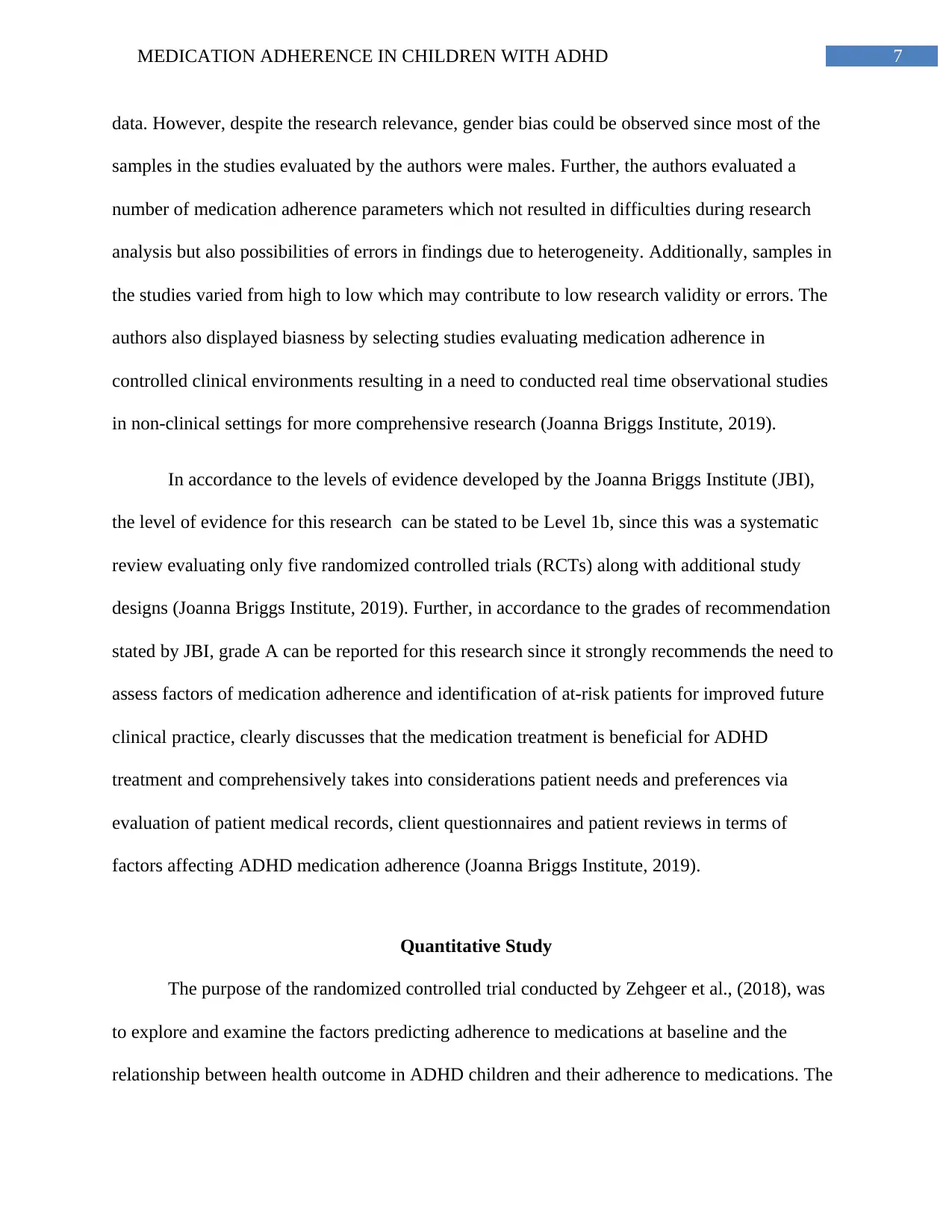
7MEDICATION ADHERENCE IN CHILDREN WITH ADHD
data. However, despite the research relevance, gender bias could be observed since most of the
samples in the studies evaluated by the authors were males. Further, the authors evaluated a
number of medication adherence parameters which not resulted in difficulties during research
analysis but also possibilities of errors in findings due to heterogeneity. Additionally, samples in
the studies varied from high to low which may contribute to low research validity or errors. The
authors also displayed biasness by selecting studies evaluating medication adherence in
controlled clinical environments resulting in a need to conducted real time observational studies
in non-clinical settings for more comprehensive research (Joanna Briggs Institute, 2019).
In accordance to the levels of evidence developed by the Joanna Briggs Institute (JBI),
the level of evidence for this research can be stated to be Level 1b, since this was a systematic
review evaluating only five randomized controlled trials (RCTs) along with additional study
designs (Joanna Briggs Institute, 2019). Further, in accordance to the grades of recommendation
stated by JBI, grade A can be reported for this research since it strongly recommends the need to
assess factors of medication adherence and identification of at-risk patients for improved future
clinical practice, clearly discusses that the medication treatment is beneficial for ADHD
treatment and comprehensively takes into considerations patient needs and preferences via
evaluation of patient medical records, client questionnaires and patient reviews in terms of
factors affecting ADHD medication adherence (Joanna Briggs Institute, 2019).
Quantitative Study
The purpose of the randomized controlled trial conducted by Zehgeer et al., (2018), was
to explore and examine the factors predicting adherence to medications at baseline and the
relationship between health outcome in ADHD children and their adherence to medications. The
data. However, despite the research relevance, gender bias could be observed since most of the
samples in the studies evaluated by the authors were males. Further, the authors evaluated a
number of medication adherence parameters which not resulted in difficulties during research
analysis but also possibilities of errors in findings due to heterogeneity. Additionally, samples in
the studies varied from high to low which may contribute to low research validity or errors. The
authors also displayed biasness by selecting studies evaluating medication adherence in
controlled clinical environments resulting in a need to conducted real time observational studies
in non-clinical settings for more comprehensive research (Joanna Briggs Institute, 2019).
In accordance to the levels of evidence developed by the Joanna Briggs Institute (JBI),
the level of evidence for this research can be stated to be Level 1b, since this was a systematic
review evaluating only five randomized controlled trials (RCTs) along with additional study
designs (Joanna Briggs Institute, 2019). Further, in accordance to the grades of recommendation
stated by JBI, grade A can be reported for this research since it strongly recommends the need to
assess factors of medication adherence and identification of at-risk patients for improved future
clinical practice, clearly discusses that the medication treatment is beneficial for ADHD
treatment and comprehensively takes into considerations patient needs and preferences via
evaluation of patient medical records, client questionnaires and patient reviews in terms of
factors affecting ADHD medication adherence (Joanna Briggs Institute, 2019).
Quantitative Study
The purpose of the randomized controlled trial conducted by Zehgeer et al., (2018), was
to explore and examine the factors predicting adherence to medications at baseline and the
relationship between health outcome in ADHD children and their adherence to medications. The
Paraphrase This Document
Need a fresh take? Get an instant paraphrase of this document with our AI Paraphraser
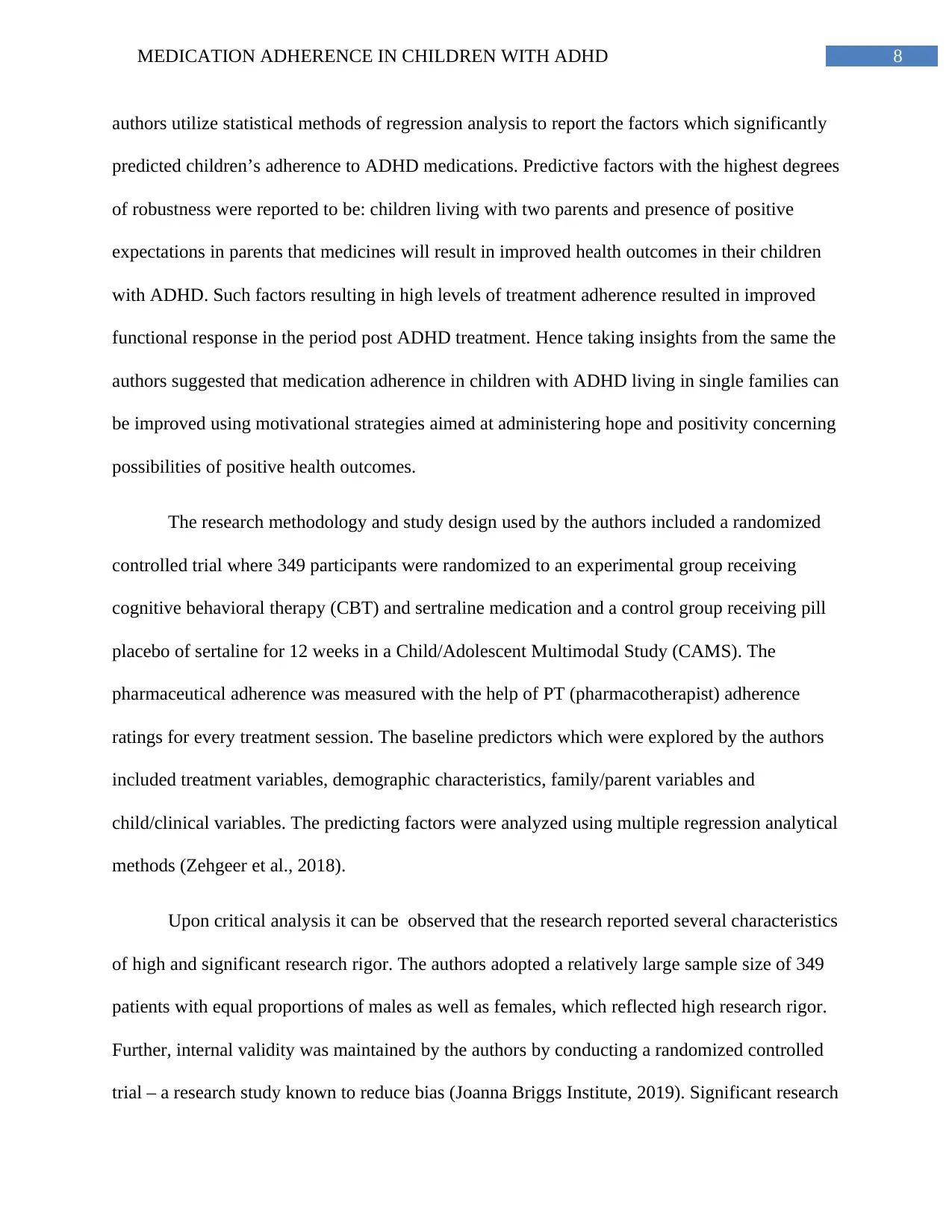
8MEDICATION ADHERENCE IN CHILDREN WITH ADHD
authors utilize statistical methods of regression analysis to report the factors which significantly
predicted children’s adherence to ADHD medications. Predictive factors with the highest degrees
of robustness were reported to be: children living with two parents and presence of positive
expectations in parents that medicines will result in improved health outcomes in their children
with ADHD. Such factors resulting in high levels of treatment adherence resulted in improved
functional response in the period post ADHD treatment. Hence taking insights from the same the
authors suggested that medication adherence in children with ADHD living in single families can
be improved using motivational strategies aimed at administering hope and positivity concerning
possibilities of positive health outcomes.
The research methodology and study design used by the authors included a randomized
controlled trial where 349 participants were randomized to an experimental group receiving
cognitive behavioral therapy (CBT) and sertraline medication and a control group receiving pill
placebo of sertaline for 12 weeks in a Child/Adolescent Multimodal Study (CAMS). The
pharmaceutical adherence was measured with the help of PT (pharmacotherapist) adherence
ratings for every treatment session. The baseline predictors which were explored by the authors
included treatment variables, demographic characteristics, family/parent variables and
child/clinical variables. The predicting factors were analyzed using multiple regression analytical
methods (Zehgeer et al., 2018).
Upon critical analysis it can be observed that the research reported several characteristics
of high and significant research rigor. The authors adopted a relatively large sample size of 349
patients with equal proportions of males as well as females, which reflected high research rigor.
Further, internal validity was maintained by the authors by conducting a randomized controlled
trial – a research study known to reduce bias (Joanna Briggs Institute, 2019). Significant research
authors utilize statistical methods of regression analysis to report the factors which significantly
predicted children’s adherence to ADHD medications. Predictive factors with the highest degrees
of robustness were reported to be: children living with two parents and presence of positive
expectations in parents that medicines will result in improved health outcomes in their children
with ADHD. Such factors resulting in high levels of treatment adherence resulted in improved
functional response in the period post ADHD treatment. Hence taking insights from the same the
authors suggested that medication adherence in children with ADHD living in single families can
be improved using motivational strategies aimed at administering hope and positivity concerning
possibilities of positive health outcomes.
The research methodology and study design used by the authors included a randomized
controlled trial where 349 participants were randomized to an experimental group receiving
cognitive behavioral therapy (CBT) and sertraline medication and a control group receiving pill
placebo of sertaline for 12 weeks in a Child/Adolescent Multimodal Study (CAMS). The
pharmaceutical adherence was measured with the help of PT (pharmacotherapist) adherence
ratings for every treatment session. The baseline predictors which were explored by the authors
included treatment variables, demographic characteristics, family/parent variables and
child/clinical variables. The predicting factors were analyzed using multiple regression analytical
methods (Zehgeer et al., 2018).
Upon critical analysis it can be observed that the research reported several characteristics
of high and significant research rigor. The authors adopted a relatively large sample size of 349
patients with equal proportions of males as well as females, which reflected high research rigor.
Further, internal validity was maintained by the authors by conducting a randomized controlled
trial – a research study known to reduce bias (Joanna Briggs Institute, 2019). Significant research
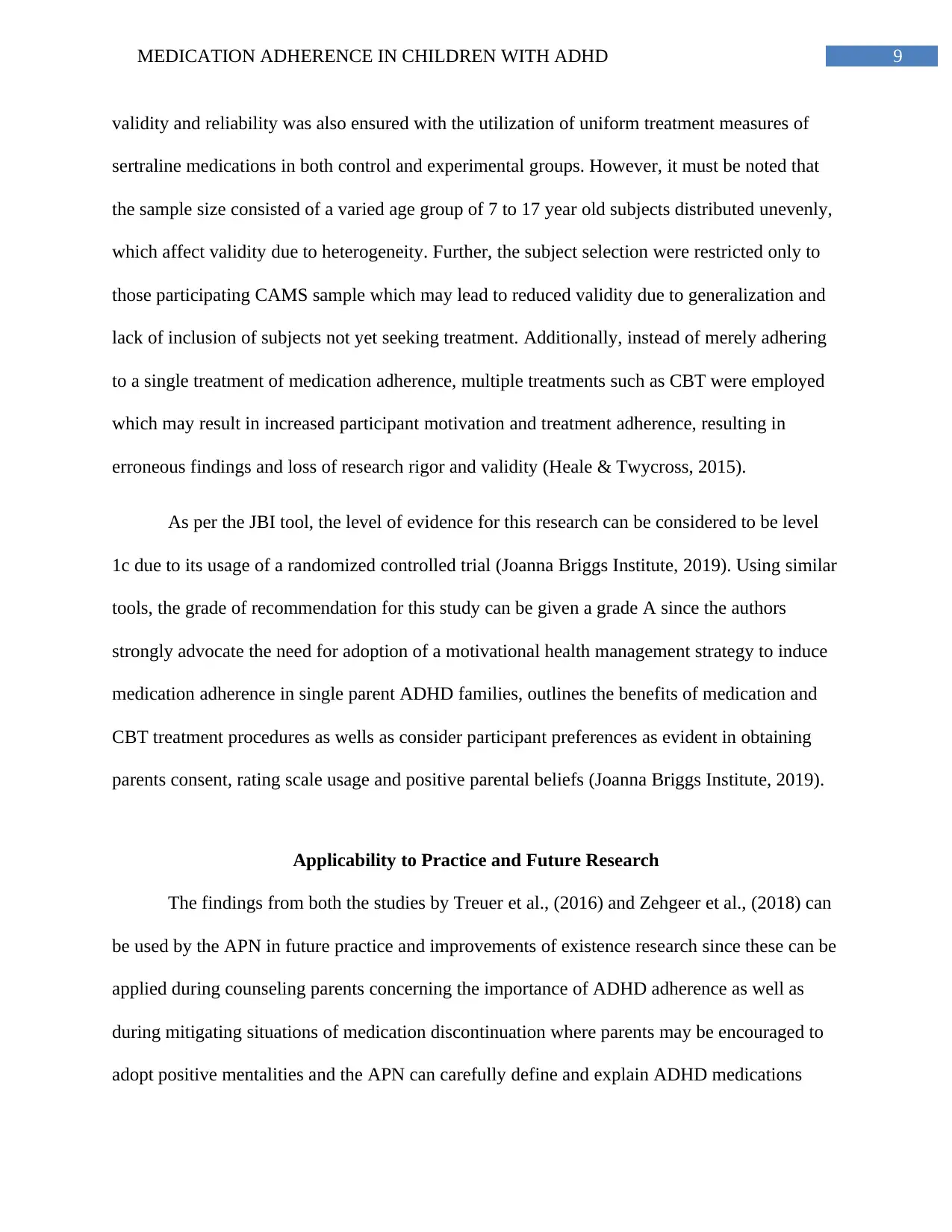
9MEDICATION ADHERENCE IN CHILDREN WITH ADHD
validity and reliability was also ensured with the utilization of uniform treatment measures of
sertraline medications in both control and experimental groups. However, it must be noted that
the sample size consisted of a varied age group of 7 to 17 year old subjects distributed unevenly,
which affect validity due to heterogeneity. Further, the subject selection were restricted only to
those participating CAMS sample which may lead to reduced validity due to generalization and
lack of inclusion of subjects not yet seeking treatment. Additionally, instead of merely adhering
to a single treatment of medication adherence, multiple treatments such as CBT were employed
which may result in increased participant motivation and treatment adherence, resulting in
erroneous findings and loss of research rigor and validity (Heale & Twycross, 2015).
As per the JBI tool, the level of evidence for this research can be considered to be level
1c due to its usage of a randomized controlled trial (Joanna Briggs Institute, 2019). Using similar
tools, the grade of recommendation for this study can be given a grade A since the authors
strongly advocate the need for adoption of a motivational health management strategy to induce
medication adherence in single parent ADHD families, outlines the benefits of medication and
CBT treatment procedures as wells as consider participant preferences as evident in obtaining
parents consent, rating scale usage and positive parental beliefs (Joanna Briggs Institute, 2019).
Applicability to Practice and Future Research
The findings from both the studies by Treuer et al., (2016) and Zehgeer et al., (2018) can
be used by the APN in future practice and improvements of existence research since these can be
applied during counseling parents concerning the importance of ADHD adherence as well as
during mitigating situations of medication discontinuation where parents may be encouraged to
adopt positive mentalities and the APN can carefully define and explain ADHD medications
validity and reliability was also ensured with the utilization of uniform treatment measures of
sertraline medications in both control and experimental groups. However, it must be noted that
the sample size consisted of a varied age group of 7 to 17 year old subjects distributed unevenly,
which affect validity due to heterogeneity. Further, the subject selection were restricted only to
those participating CAMS sample which may lead to reduced validity due to generalization and
lack of inclusion of subjects not yet seeking treatment. Additionally, instead of merely adhering
to a single treatment of medication adherence, multiple treatments such as CBT were employed
which may result in increased participant motivation and treatment adherence, resulting in
erroneous findings and loss of research rigor and validity (Heale & Twycross, 2015).
As per the JBI tool, the level of evidence for this research can be considered to be level
1c due to its usage of a randomized controlled trial (Joanna Briggs Institute, 2019). Using similar
tools, the grade of recommendation for this study can be given a grade A since the authors
strongly advocate the need for adoption of a motivational health management strategy to induce
medication adherence in single parent ADHD families, outlines the benefits of medication and
CBT treatment procedures as wells as consider participant preferences as evident in obtaining
parents consent, rating scale usage and positive parental beliefs (Joanna Briggs Institute, 2019).
Applicability to Practice and Future Research
The findings from both the studies by Treuer et al., (2016) and Zehgeer et al., (2018) can
be used by the APN in future practice and improvements of existence research since these can be
applied during counseling parents concerning the importance of ADHD adherence as well as
during mitigating situations of medication discontinuation where parents may be encouraged to
adopt positive mentalities and the APN can carefully define and explain ADHD medications
⊘ This is a preview!⊘
Do you want full access?
Subscribe today to unlock all pages.

Trusted by 1+ million students worldwide
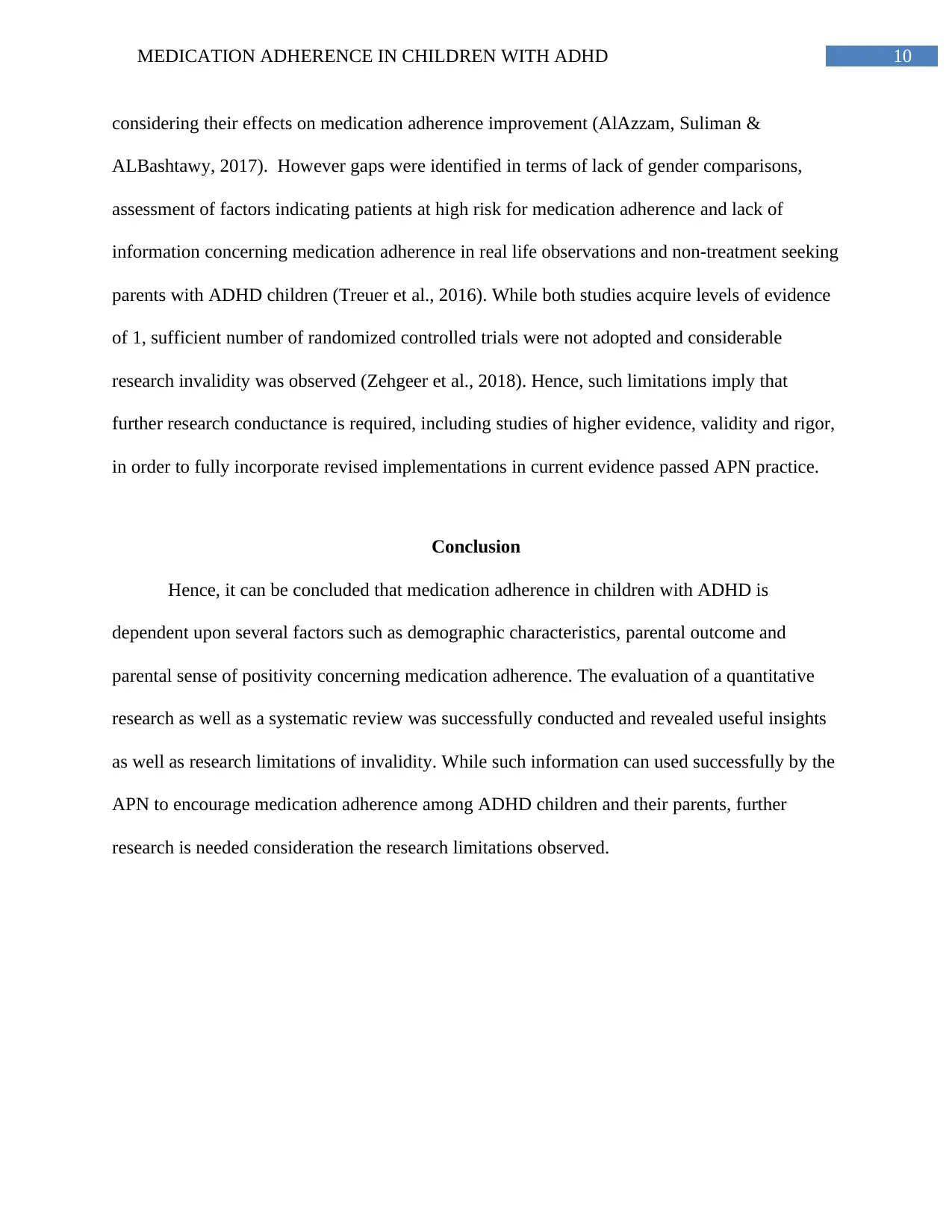
10MEDICATION ADHERENCE IN CHILDREN WITH ADHD
considering their effects on medication adherence improvement (AlAzzam, Suliman &
ALBashtawy, 2017). However gaps were identified in terms of lack of gender comparisons,
assessment of factors indicating patients at high risk for medication adherence and lack of
information concerning medication adherence in real life observations and non-treatment seeking
parents with ADHD children (Treuer et al., 2016). While both studies acquire levels of evidence
of 1, sufficient number of randomized controlled trials were not adopted and considerable
research invalidity was observed (Zehgeer et al., 2018). Hence, such limitations imply that
further research conductance is required, including studies of higher evidence, validity and rigor,
in order to fully incorporate revised implementations in current evidence passed APN practice.
Conclusion
Hence, it can be concluded that medication adherence in children with ADHD is
dependent upon several factors such as demographic characteristics, parental outcome and
parental sense of positivity concerning medication adherence. The evaluation of a quantitative
research as well as a systematic review was successfully conducted and revealed useful insights
as well as research limitations of invalidity. While such information can used successfully by the
APN to encourage medication adherence among ADHD children and their parents, further
research is needed consideration the research limitations observed.
considering their effects on medication adherence improvement (AlAzzam, Suliman &
ALBashtawy, 2017). However gaps were identified in terms of lack of gender comparisons,
assessment of factors indicating patients at high risk for medication adherence and lack of
information concerning medication adherence in real life observations and non-treatment seeking
parents with ADHD children (Treuer et al., 2016). While both studies acquire levels of evidence
of 1, sufficient number of randomized controlled trials were not adopted and considerable
research invalidity was observed (Zehgeer et al., 2018). Hence, such limitations imply that
further research conductance is required, including studies of higher evidence, validity and rigor,
in order to fully incorporate revised implementations in current evidence passed APN practice.
Conclusion
Hence, it can be concluded that medication adherence in children with ADHD is
dependent upon several factors such as demographic characteristics, parental outcome and
parental sense of positivity concerning medication adherence. The evaluation of a quantitative
research as well as a systematic review was successfully conducted and revealed useful insights
as well as research limitations of invalidity. While such information can used successfully by the
APN to encourage medication adherence among ADHD children and their parents, further
research is needed consideration the research limitations observed.
Paraphrase This Document
Need a fresh take? Get an instant paraphrase of this document with our AI Paraphraser
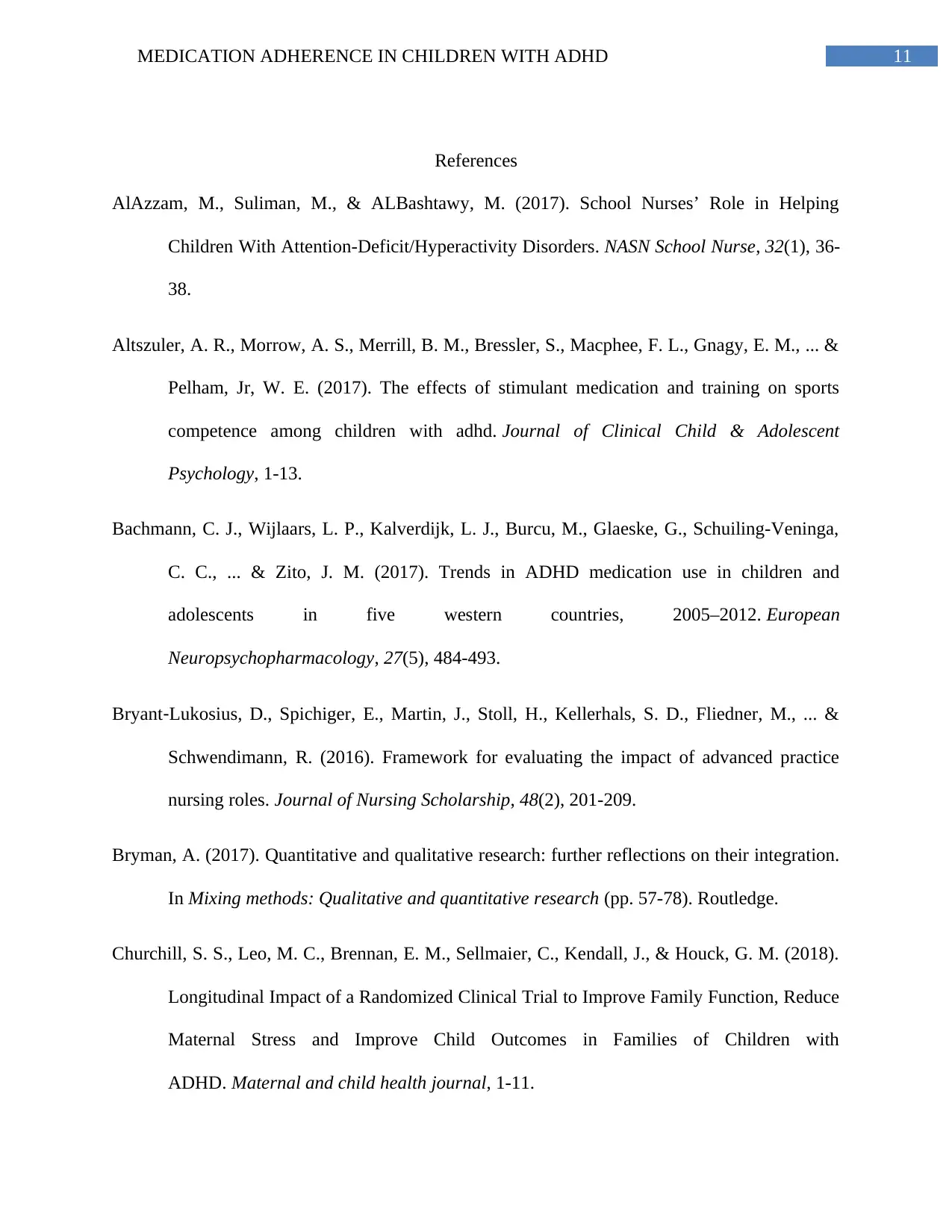
11MEDICATION ADHERENCE IN CHILDREN WITH ADHD
References
AlAzzam, M., Suliman, M., & ALBashtawy, M. (2017). School Nurses’ Role in Helping
Children With Attention-Deficit/Hyperactivity Disorders. NASN School Nurse, 32(1), 36-
38.
Altszuler, A. R., Morrow, A. S., Merrill, B. M., Bressler, S., Macphee, F. L., Gnagy, E. M., ... &
Pelham, Jr, W. E. (2017). The effects of stimulant medication and training on sports
competence among children with adhd. Journal of Clinical Child & Adolescent
Psychology, 1-13.
Bachmann, C. J., Wijlaars, L. P., Kalverdijk, L. J., Burcu, M., Glaeske, G., Schuiling-Veninga,
C. C., ... & Zito, J. M. (2017). Trends in ADHD medication use in children and
adolescents in five western countries, 2005–2012. European
Neuropsychopharmacology, 27(5), 484-493.
Bryant‐Lukosius, D., Spichiger, E., Martin, J., Stoll, H., Kellerhals, S. D., Fliedner, M., ... &
Schwendimann, R. (2016). Framework for evaluating the impact of advanced practice
nursing roles. Journal of Nursing Scholarship, 48(2), 201-209.
Bryman, A. (2017). Quantitative and qualitative research: further reflections on their integration.
In Mixing methods: Qualitative and quantitative research (pp. 57-78). Routledge.
Churchill, S. S., Leo, M. C., Brennan, E. M., Sellmaier, C., Kendall, J., & Houck, G. M. (2018).
Longitudinal Impact of a Randomized Clinical Trial to Improve Family Function, Reduce
Maternal Stress and Improve Child Outcomes in Families of Children with
ADHD. Maternal and child health journal, 1-11.
References
AlAzzam, M., Suliman, M., & ALBashtawy, M. (2017). School Nurses’ Role in Helping
Children With Attention-Deficit/Hyperactivity Disorders. NASN School Nurse, 32(1), 36-
38.
Altszuler, A. R., Morrow, A. S., Merrill, B. M., Bressler, S., Macphee, F. L., Gnagy, E. M., ... &
Pelham, Jr, W. E. (2017). The effects of stimulant medication and training on sports
competence among children with adhd. Journal of Clinical Child & Adolescent
Psychology, 1-13.
Bachmann, C. J., Wijlaars, L. P., Kalverdijk, L. J., Burcu, M., Glaeske, G., Schuiling-Veninga,
C. C., ... & Zito, J. M. (2017). Trends in ADHD medication use in children and
adolescents in five western countries, 2005–2012. European
Neuropsychopharmacology, 27(5), 484-493.
Bryant‐Lukosius, D., Spichiger, E., Martin, J., Stoll, H., Kellerhals, S. D., Fliedner, M., ... &
Schwendimann, R. (2016). Framework for evaluating the impact of advanced practice
nursing roles. Journal of Nursing Scholarship, 48(2), 201-209.
Bryman, A. (2017). Quantitative and qualitative research: further reflections on their integration.
In Mixing methods: Qualitative and quantitative research (pp. 57-78). Routledge.
Churchill, S. S., Leo, M. C., Brennan, E. M., Sellmaier, C., Kendall, J., & Houck, G. M. (2018).
Longitudinal Impact of a Randomized Clinical Trial to Improve Family Function, Reduce
Maternal Stress and Improve Child Outcomes in Families of Children with
ADHD. Maternal and child health journal, 1-11.
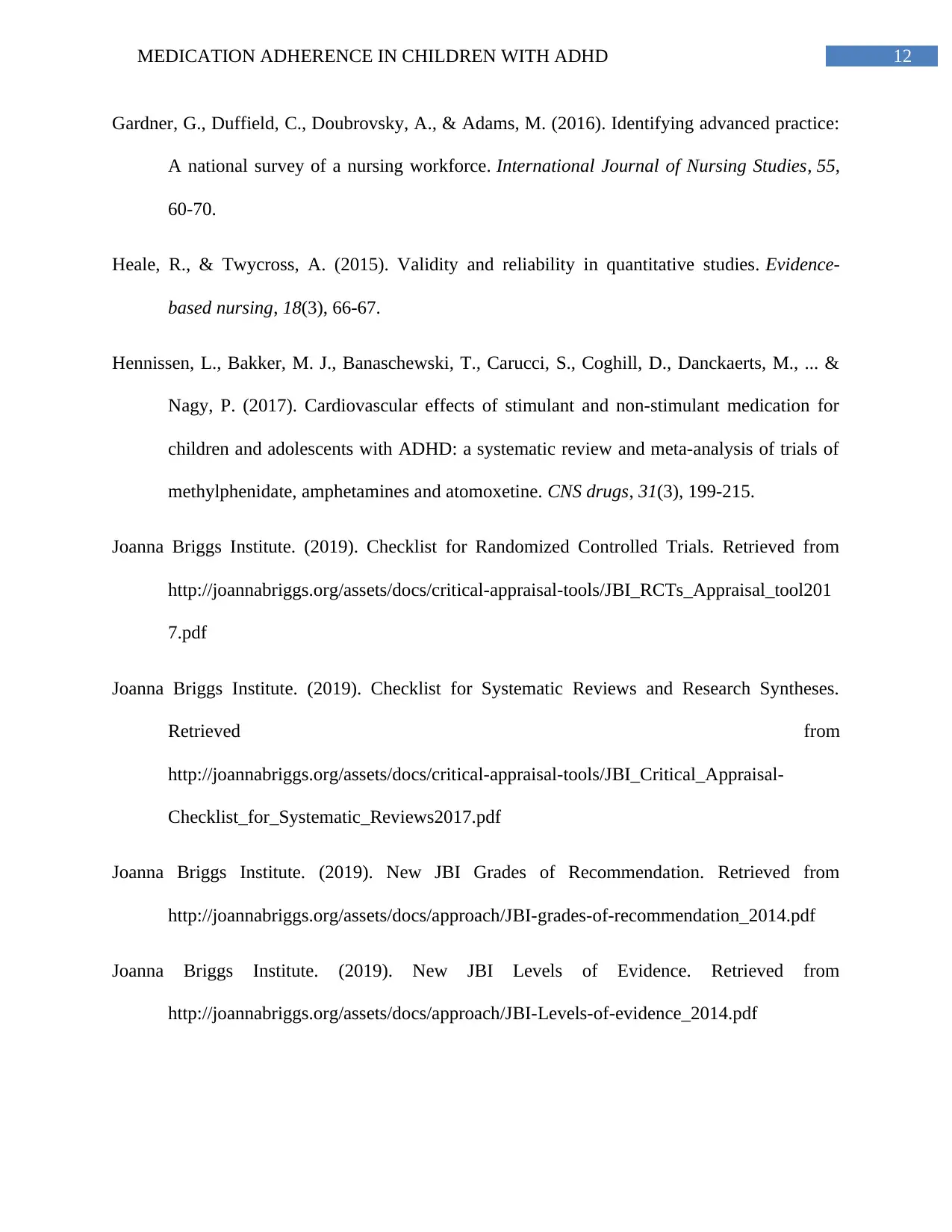
12MEDICATION ADHERENCE IN CHILDREN WITH ADHD
Gardner, G., Duffield, C., Doubrovsky, A., & Adams, M. (2016). Identifying advanced practice:
A national survey of a nursing workforce. International Journal of Nursing Studies, 55,
60-70.
Heale, R., & Twycross, A. (2015). Validity and reliability in quantitative studies. Evidence-
based nursing, 18(3), 66-67.
Hennissen, L., Bakker, M. J., Banaschewski, T., Carucci, S., Coghill, D., Danckaerts, M., ... &
Nagy, P. (2017). Cardiovascular effects of stimulant and non-stimulant medication for
children and adolescents with ADHD: a systematic review and meta-analysis of trials of
methylphenidate, amphetamines and atomoxetine. CNS drugs, 31(3), 199-215.
Joanna Briggs Institute. (2019). Checklist for Randomized Controlled Trials. Retrieved from
http://joannabriggs.org/assets/docs/critical-appraisal-tools/JBI_RCTs_Appraisal_tool201
7.pdf
Joanna Briggs Institute. (2019). Checklist for Systematic Reviews and Research Syntheses.
Retrieved from
http://joannabriggs.org/assets/docs/critical-appraisal-tools/JBI_Critical_Appraisal-
Checklist_for_Systematic_Reviews2017.pdf
Joanna Briggs Institute. (2019). New JBI Grades of Recommendation. Retrieved from
http://joannabriggs.org/assets/docs/approach/JBI-grades-of-recommendation_2014.pdf
Joanna Briggs Institute. (2019). New JBI Levels of Evidence. Retrieved from
http://joannabriggs.org/assets/docs/approach/JBI-Levels-of-evidence_2014.pdf
Gardner, G., Duffield, C., Doubrovsky, A., & Adams, M. (2016). Identifying advanced practice:
A national survey of a nursing workforce. International Journal of Nursing Studies, 55,
60-70.
Heale, R., & Twycross, A. (2015). Validity and reliability in quantitative studies. Evidence-
based nursing, 18(3), 66-67.
Hennissen, L., Bakker, M. J., Banaschewski, T., Carucci, S., Coghill, D., Danckaerts, M., ... &
Nagy, P. (2017). Cardiovascular effects of stimulant and non-stimulant medication for
children and adolescents with ADHD: a systematic review and meta-analysis of trials of
methylphenidate, amphetamines and atomoxetine. CNS drugs, 31(3), 199-215.
Joanna Briggs Institute. (2019). Checklist for Randomized Controlled Trials. Retrieved from
http://joannabriggs.org/assets/docs/critical-appraisal-tools/JBI_RCTs_Appraisal_tool201
7.pdf
Joanna Briggs Institute. (2019). Checklist for Systematic Reviews and Research Syntheses.
Retrieved from
http://joannabriggs.org/assets/docs/critical-appraisal-tools/JBI_Critical_Appraisal-
Checklist_for_Systematic_Reviews2017.pdf
Joanna Briggs Institute. (2019). New JBI Grades of Recommendation. Retrieved from
http://joannabriggs.org/assets/docs/approach/JBI-grades-of-recommendation_2014.pdf
Joanna Briggs Institute. (2019). New JBI Levels of Evidence. Retrieved from
http://joannabriggs.org/assets/docs/approach/JBI-Levels-of-evidence_2014.pdf
⊘ This is a preview!⊘
Do you want full access?
Subscribe today to unlock all pages.

Trusted by 1+ million students worldwide
1 out of 18
Related Documents
Your All-in-One AI-Powered Toolkit for Academic Success.
+13062052269
info@desklib.com
Available 24*7 on WhatsApp / Email
![[object Object]](/_next/static/media/star-bottom.7253800d.svg)
Unlock your academic potential
Copyright © 2020–2025 A2Z Services. All Rights Reserved. Developed and managed by ZUCOL.





